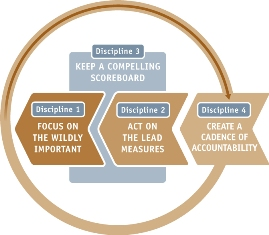Investing in Yourself Guided by the Four Disciplines of Execution
When people ask me how I am, my usual response is, “Fabulous, but soooo busy.” I am lucky to have so much work in a time of economic insecurity, but it seems like the work is never-ending, and if I don’t set boundaries, it is.
Right now, many educators are struggling. I see them. And it’s because they have let the “busy” take over not only their work, but their lives and their families. Stopping the pattern is easier said than done. But it is possible.

This week, I read The Four Disciplines of Execution, which is essentially a business blueprint for reaching “wildly important goals.” Apparently, my husband was so inspired by this book that he bought it not once, but twice (Amazon Amnesia is for real, amiright?!), and after seeing it sitting around, I decided to pick it up. As I read, I was struck with the concept of the “whirlwind,” or the massive amount of energy that’s necessary just to keep you going on a day-to-day basis.
Many educators are stuck in a whirlwind. We plan for school, our classes, and families, but are we planning to take time for ourselves?
To be engaged, learners have to be self-regulated and have to take time for reflection, mindfulness, and joy. And if this is to happen, it needs to be because your own happiness is your wildly important goal. Below are tips on how to do this guided by some of the UDL Guidelines and checkpoints, a focus on being proactive and on self-care:
#1. Heighten the salience of goals and objectives
- Write down what you want to achieve in terms of balance. THIS is the time to start a new hobby, work your way through your book pile, or go out and enjoy the crisp air and a latte twice a week.
- Start by laying out your immediate goals vs. long term goals.
- As an example, my wildly important goals are to continue to learn, on my time, spend time with each of my kids, date my amazing husband, and exercise every day.
#2. Foster collaboration and community
- Discuss your goals with your life partner, colleagues, and your friends.
- What do you need to do, right now, to find joy?
- Share, “I have been focused way too much on work – Saturday is going to be a work-free day for me from now on” (and maybe you invite them to do things with you!).
- I told my four kiddos – “I want to spend at least 30 minutes a week with each of you, alone. Can you make sure you remind me to do that?”
#3. Guide appropriate goal setting

- In The Four Disciplines of Execution, the authors discuss the importance of lead measures or concrete action steps. You can help to guide goal-setting by being clear about lead measures like, “Read every day for a minimum of 20 minutes,” or “Go outside and walk for 10 minutes while listening to my favorite music.”
- Set goals and milestones.
- Put reminders and deadlines on your calendar. YOU deserve every second that you invest in yourself.
- My goals are simple: Read a book a week, walk my dog every day, spend at least 30 minutes with each of my kids, alone, every week doing what they want to do (x4), and unplug on Saturdays (no emails, presentations, or work).
#4. Minimize threats and distractions.
- If applicable, plan childcare or child distraction (“You can play on your phones for a half hour because I am going to go into my room and read,”) – in advance – this helps to alleviate any stress as well as help to keep you accountable towards those goals!
- I love to make calendar appointments that say, “Do NOT book. Katie time.” (PS, my COO/sister is often better at enforcing these time blocks than I am, but it is GREAT to have an accountability partner! More on that below!)
#5. Enhance capacity for monitoring your progress.
- The third discipline of execution is to track your progress toward your lead goals. Literally – make yourself a scoreboard or a sticker chart. Every time to invest in yourself, make a note of it. Want to attend a virtual fitness class once a week? Have a date with your partner or friend every Saturday? Meditate for 10 minutes a day? Create a scoreboard and track your progress. You are worth it.
- Be kind to yourself! You should expect that this process will not be a consistent gradual climb upwards toward success. There will be victories and setbacks. Hopefully, the setbacks will be minor and only require minimal adjustments but keep your eyes on the goal and continue to work towards it.
- Create a cadence of accountability. This fourth discipline is critical. You need a network, a “professional learning community for you” (#PLC4U). Share your goals, and encourage your loved ones to set their own self-care goals. And then check in once a week on your progress, give each other pep talks and text reminders, and know that right now, YOU are important.
We cannot put ourselves on the shelf and pour into the whirlwind that education has become. Instead, we have to find balance and joy so we are renewed and refreshed when it’s time to dive back in. Know that taking time for yourself is an investment in your work with students, and most importantly, it’s an investment in your mental health.
"We cannot put ourselves on the shelf and pour into the whirlwind that education has become."
I, for one, will continue to read a book a week, walk my dog every day, spend at least 30 minutes with each of my kids, alone, every week doing what they want to do (x4), and will completely unplug on Saturdays. And when I commit to those lead measures, my wildly important goal of taking care of myself, so I can be better for work, will be achieved.
While on this journey, please make sure to stay flexible and cherish the life you are living at the same time you are trying to improve it. Don’t be so focused that all you do is work! Take time to “be there” for the “others” in your life. Be a friend. Be a parent. Fulfill your responsibilities. Be kind and supportive to those around you. Relax. Be you. Find the right balance that you will need to make all of this happen.



